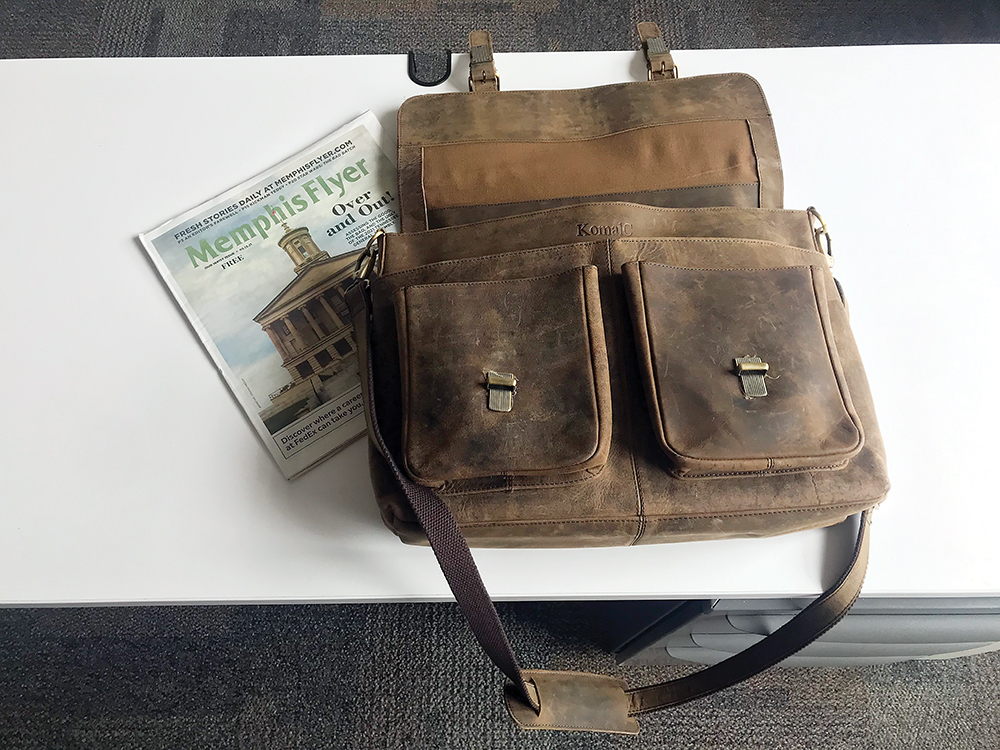There’s something undeniably unsettling about an empty house, a too-spacious office. In my life, I’ve moved close to three dozen times, so I’m fairly comfortable with the rhythms of adjusting to a new space. At first, it feels like you and your surroundings are taking the measure of each other. Eventually, as boxes are unpacked and furniture is shuffled around, you realize it’s been a day, a week since you thought about the previous occupant. You realize you’ve settled in.
Last week, I made my return to the Flyer’s Downtown offices. But not to my same seat between our excellent associate editor, Toby Sells, and our food and party writer, the inimitable Michael Donahue. No, I find myself settling into what, to me, still feels like former editor Bruce VanWyngarden’s office. As of this writing, I have far more memories of ducking into this office to ask Bruce about a headline, let him know I was taking a vacation day, or to argue over a particularly thorny bit of wording.
It doesn’t make the move any easier that the office has undergone other changes as well. There are hand sanitizer dispensers in the elevators and bathrooms, and we’re all wearing masks in the common areas, of course. There are new faces in the halls and new names on the masthead. That, at least, is a welcome difference, a sign of growth.
All these changes come at a time when our communities are undergoing changes as well. The pandemic that drove us all — or at least those fortunate enough to be able to work from home — from our offices and shared spaces is still not over. But there are undeniable signs of hope. The COVID vaccine is readily available, something that I wouldn’t have thought possible at this point in the year if someone had asked me at the beginning of January. I’ve taken advantage of it, and I am fully vaccinated as of this writing. It’s a welcome change, a layer of worry I shed gratefully. In fact, last weekend I went to two (small, outdoor, relatively intimate) graduation parties.
It was a relief that hit me in a way I find hard to put into words. I’ve never been one for large gatherings or official ceremonies, but picking up barbecue to bring to a party, I realized how profoundly even I had missed these moments. And how fortunate I am to be alive and healthy and able to take my first small steps back toward something resembling “normal.”
But by normal, I don’t mean “a return to the way things were in 2019.” Here at the Flyer and in the world at large, we’re starting a new chapter, whether we like it or not. I’m not Bruce, and I won’t do him, our staff, or our readers the disservice of attempting to imitate him. Likewise, even if those of us who are vaccinated can safely gather to celebrate milestones and share barbecue, there’s no getting around the fact that the world has changed. We ignore it to our detriment. Instead, we should strive to learn from this year of loss and change.
We owe it to the more than 586,000 Americans who won’t get the chance to begin a new chapter. We owe it to the people who worked and sacrificed and put their health and safety on the line to get us here. The doctors and nurses, the scientists, the protesters and activists. A return to normal won’t cut it, should never have been the goal anyway.
In an attempt to reacclimate myself to office life, I walked around Downtown near Main Street this morning. I passed the souvenir shop on Beale where I used to work, years ago, in my work-two-jobs, ramen-and-PB&J days, where I used to read the Flyer on slow nights. I passed the practice space where a band of mine used to play. It was musty, not air-conditioned, and up three flights of steep stairs. I don’t want to return to our old ways of thinking any more than I want to carry a 30-year-old bass amplifier up those stairs again. I have a certain fondness for those days, of course, but trying to relive them would be an exercise in futility, a waste of precious time.
Change will be uncomfortable, but we’re going to be uncomfortable anyway. If it’s unavoidable, it might as well be for a good reason — because we’re brave enough to try to grow, to reassess how we value healthcare and access and equity. To do the work to better old systems, even if many of us don’t know the solution. Yes, change is uncomfortable, but I’m not worried. It’s just a new way of looking at things, like moving into a new home.
We’ll settle in.
